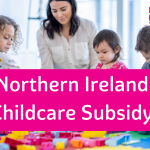New tax year sees changes to the support available to families
The new tax year in April saw a number of changes announced which impact families, including a reduction in National Insurance Contributions for most employees, changes to Child Benefit and an uplift to benefits and pensions.
National Insurance
From April, there has been a cut in the main rate of Class 1 National Insurance from 10% to 8%. Following the previous reduction from 12% in January, this means that someone on the average salary in Northern Ireland of around £33,000 will see a reduction in their National Insurance contributions of £817.
However, parents who use Childcare Vouchers to pay for registered childcare will see the level of savings they can make through this scheme reduced as a result of the cut to National Insurance. Prior to this latest change parents who were salary sacrificing the maximum amount into the Childcare Voucher scheme would have been saving £77.76 per month, whereas now after the changes the maximum they can save is £68.04 per month. This is a reduction in savings of over £116 per year, meaning that parents may be better off on an alternative form of support towards their childcare costs such as Tax-Free Childcare or Universal Credit.
Child Benefit
From April, the threshold at which families lose some of their Child Benefit through the High Income Child Benefit Charge has risen from £50,000 to £60,000. This rise has taken around 170,000 families across the UK out of paying this tax and losing some or all of their Child Benefit. In addition, the rate of this charge has been halved, meaning that Child Benefit is not fully taxed through this charge until individuals earn £80,000 or higher. Those earning between £60,000 and £80,000 will lose 5% of their Child Benefit for each £1,000 they earn above £60,000.
The Government has acknowledged that while this change is of some help, the administration of the High Income Child Benefit Charge is still unfair towards single earner families, and plans to administer this charge on a household earnings basis rather than on individual earnings by April 2026.
Uplifts in benefits and National Living and Minimum Wages
From April 2024 benefits, including Universal Credit and Tax Credits, have been uplifted by 6.7%. In addition, for those who are paying for registered childcare, the amount of support towards childcare costs through Universal Credit has risen by 6.7% to £1014.63 for one child and £1739.37 for two or more children. As there has be no equivalent uplift to the childcare element of Tax Credit this means that the support towards registered childcare costs through Universal Credit is now almost double that paid through Tax Credits.
There has been no increase to the support available to families through Tax-Free Childcare, which continues to pay 20% of a family’s registered childcare costs, up to the maximum of £2,000 per child per year. Employers For Childcare continues to campaign for the cap on support through Tax-Free Childcare to be removed, and the level of support increased from 20%.
There has also been an increase in the National Living and Minimum Wages of approximately 9.8%, with the age threshold for the National Living Wage lowering from 23 to 21.
The State Pension and Pension Credit have also been uprated, in line with average earnings growth of 8.5%.
We are here to help you
We know it can be difficult to work out what financial support is available for your family interpreting what these changes may mean for you, and to know if you would be better on an alternative form of support. We want to make sure all families are receiving everything they are entitled to. For free, impartial and confidential advice, call our Family Benefits Advice Service on 028 9267 8200 or email hello@employersforchildcare.org.






